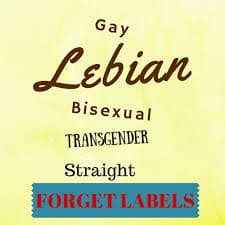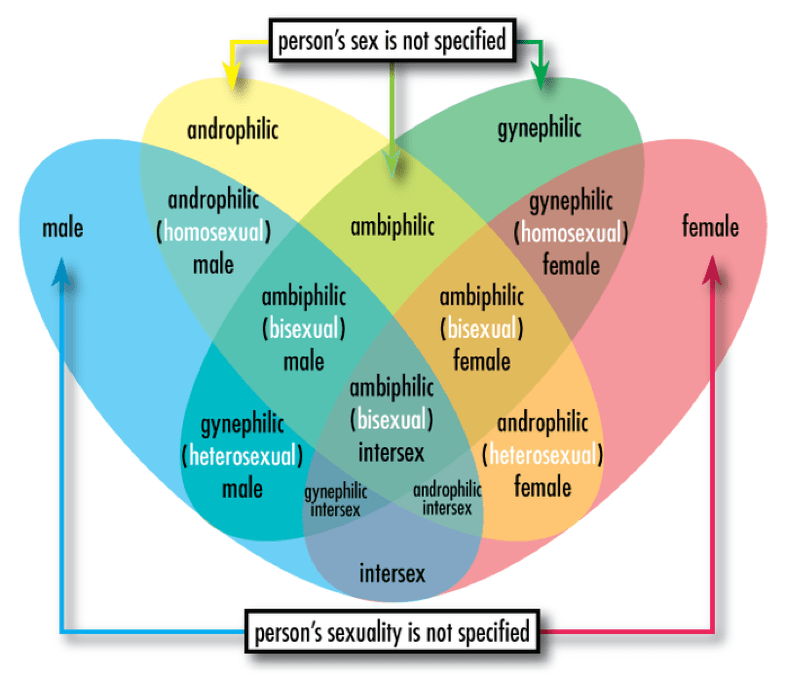There are so many sexual orientation labels but sometimes a label can be bad for you. We delve into why!

For a very long time, there was only one sexual orientation that was accepted as normal: a heterosexual or straight orientation. This meant a relationship between a man and a woman. As we have grown as a society with our sexuality and embraced new ideas and ways of thinking, we have started to create and develop new labels. It started off with gay and lesbian and it has been growing from there. But are labels a good thing? We'll delve into why they may be a bad thing, including how labels can limit and pressure us, and also how they can be good, like how they can help us with our identity.
Before we go any further, let's talk about what a sexual orientation label is. It's
pretty much exactly how it sounds: a label for the type of sex and relationship that you
enjoy and seek out. Labels are used so that people can identify other people with the
same orientation and preference.
Sexual orientation labels are not the same as
stereotypes and are not meant to offend or be slurs. Rather, they are identification
markers. In general, most people like labels and don't have a problem with them!


For a long time there was just one label: straight. As we started to become more open
with our sexuality and started growing as a society, more labels were created. The
labels were created out of need: people were discovering new ways in which they were
attracted to other people and wanted a way to define it. Below we will list some of the
more popular orientations!
Straight
Straight or
heterosexual is the most common kind of orientation. If you are a straight man you are
attracted to women; and if you are a straight woman you are attracted to men. It is also
the default one that is considered "normal." This is because it was only okay to be
straight for a long time; no other orientations were accepted. In many places it is
still only okay to be straight. This is one of the easiest labels and often one that
straight people don't mind having.
Gay and Lesbian
After straight, the next most popular orientation is the gay and lesbian orientation. We use two different words but they both mean the same thing: you are attracted to members of the same sex. For some reason we came up with a word for men who like men, which is gay, and a separate word for women who like women, which is lesbian. Interestingly, you could still call a lesbian "gay" and it would most likely be accepted. However, you would never call a gay man a "lesbian."
Bisexual
The bisexual label is one that is still struggling to be accepted in the LGBTQ community. Yes, this is despite having its very own letter in LGBTQ! A bisexual person is someone who is attracted to both men and women. A lot of people claim that bisexuality is just a phase or that the person is not serious and just not wanting to make a commitment to straight or gay. Well, this is simply not the case! Bisexuals certainly are real and they deserve to be seen and respected on the gender and sexual orientation spectrum!
Pansexual
Pansexual is a newer gender identity and label that has been growing in popularity over the past few years. It is similar to bisexual but also a bit different. A pansexual is attracted towards anybody regardless of their sex or gender identity. It is more encompassing than bisexual because it doesn't stop at just men and women. A pansexual could be attracted to someone non-comforting who doesn't identify as anything, for example. This orientation is definitely not as popular as the others but it is still just as valid!
Asexual
Another slightly newer sexual orientation label is asexual. A person who is asexual if not sexually attracted to anyone. They are not attracted to women, men, or anyone/everyone in between. This doesn't mean that asexual people can't have meaningful relationships. It's quite the opposite, in fact! All asexual means is that a person is not sexually interested in others. However, they can still be emotionally and romantically interested in other people. This means they can still have very lovely and fulfilling relationships.
Queer
Queer is a sexual orientation that encompasses the gay, lesbian, and bi community. To say you are queer means that you could be any of those other labels. People in the LGBTQ community enjoy using "queer" to self identify as it is a more casual and personal word. However, be careful with this label. It is more casual, yes, but it is mostly used by people who are in the community. A gay person can totally call themselves queer but it is not always okay for a straight person to refer to a gay person as queer.
Plus so many more!
We just listed seven sexual orientation labels. That is a lot! However, it doesn't even scratch the surface. There are so many more sexual orientation labels. In fact, there are so many it would take way too long to list them here! As people grow and continue to explore their sexuality, new labels will continue to be created.
We've gone over the basics of sexual orientation labels and listed some examples. Now it's time to talk about how they can be harmful. In general, labels are great as it is always good to have a way to identify yourself and other people. However, they can definitely be harmful too. Below we list off some of the ways that these labels can be harmful. There are six listed here, however there can be many more! This is not meant to be a discouragement to labels. Rather, we are listing them here as a precautionary measure!
They can be imposed on us.
Labels are great when we can apply them to ourselves. However, if someone gives us a label, it can be quite the negative experience. Someone could decide what they think you are based on stereotypes, judgements, and assumptions. This can leave you feeling confused and betrayed. After all, you didn't come up with that label for yourself. It can also make you feel not like yourself, which is a terrible feeling to have! We should never accept a label from someone else. The only labels that count are the ones that we fully decide on for ourselves!
They should not dictate our identity or preferences.
Labels are definitely great but they can be sort of restrictive at times. With any labels comes assumptions and stereotypes. If we want to avoid any of the stereotypes and assumptions that come with a label we might want to apply to ourselves, the best thing to do is simply avoid labels all together. It can be bit difficult to completely remove yourself from labels entirely, as we are a very title and label orientated society. However, it can definitely be done and often the freedom is totally worth it!
They can be used as slurs.
A label can be used against us. This is one of the worst things about labels. You may identify with and label yourself as gay and there is nothing wrong with this at all. However, someone else who is homophobic might call you gay as an insult. They are applying a negative emotion or reaction to the label, which in turn transfers it to you. This is a terrible thing, obviously, and is hard to be avoided sometimes. The best thing to do in these situations is to ignore the people using the labels as slurs.
They can cause you to be defined by your relationship.
Sometimes labels can be restrictive in that they are simply an outward reflection of our orientation. The best example of this is when it comes to being bisexual. You might be a bisexual woman but find yourself in a long-term relationship with a man. This does not mean that you are now heterosexual or straight. Just because you are in what appears to be a straight relationship doesn't make you straight. You are still bisexual. However, on the outside it doesn't look like it at all.
They can limit gender expression.
A label can be great but it can also be a bit limiting. Perhaps you want to stretch and experiment farther than labels will allow you too. This is why a lot of progressive people don't want to be labeled at all. They would rather be completely unrestricted so they can explore their bodies and sexuality fully. It can be daunting to exist in the world without a label but at the same time it can be super freeing too!
You can feel pressured to choose a label.
Often we can feel super pressured to apply a label to ourselves and our lives. This is because, like we mentioned before, we are a society that thrives on labels and titles. We always want to know exactly what sort of box to put people in. We want there to be a name. Because of this, we may feel like we have to chose a label so other people, or even ourselves, know what box to put us in.
We've gone over the bad things about sexual orientation labels. However, in an effort to present a well balanced and fair guide, we also want to list some of the positive things. Many people have a super awesome and positive experience with labels so it is worth going over some of those good things! That way you can make the most informed decision about whether or not you want to be labeled!
They can help you identify yourself.
One of the most important things we will do in our lives is identify who we are and what we want in life. By identifying certain things in our lives, we can learn more about ourselves. And when we know more about ourselves, we better understand ourselves. That understanding can lead us to making the best decisions for ourselves. A label can help us to better understand your sexuality and gender preferences.
We need vocabulary to grow the community.
Without labels, we have no words for all the different gender orientations. And without words, we have no way to describe and grow the sexual community. We are wanting to be super free and expressive with our sexuality. In order to do that, we need to explore and experiment to identify as many different facets and aspects of sexuality that we can. And to help people better understand them, we need to give them names or labels. By having lots of names and labels, we can better illustrate just how vast and interesting sexual orientation and gender identity can be.
It's part of the journey to self acceptance.
In order to truly accept yourself and grow as a person, you need to be able to identify yourself. To know yourself is to accept yourself, after all. There may be aspects of your sexuality that you need to come to terms with and a label can be super helpful with that!
We hope this guide has helped you to better understand sexual orientation labels. While there are both good and bad things about labels, ultimately it is up to you whether or not you apply them in your own life. If you are comfortable with them, go for it!
Did we answer all your questions you needed on this subject? If so, then why not check out our other extensive LGBT advice guides by CLICKING HERE?
Want to know why you should avoid the gym for gay hookups? Find out now by reading our article HERE!